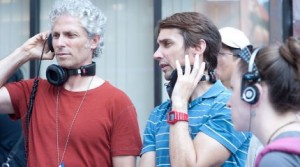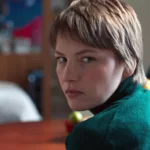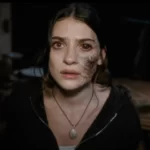Directors Scott McGhee and David Seigel aren’t newcomers to the film scene, by any means, but their latest project ‘What Maisie Knew’ is something of a unique production. The film is an adaptation of a century-old Henry James novel, modernising the setting and telling a very grown up story of adultery and divorce from the perspective of a six year old protagonist.
It tells the story of the young girl Maisie (Onata Aprile) whose wayward parents (Steve Coogan and Julianne Moore) are finding their marriage crumbling apart in a disastrous way. Amongst the chaos she is struggling to understand, Maisie is time and time again forgotten and ignored as she is palmed off into the custody of various people.
TOM Magazine’s Adam Harmer had the opportunity to speak with the film makers about the number of challenges they faced on the project.
TOM Magazine: Thanks for talking to us, guys. How did you guys get started with film making?
SCOTT: We were quite naive when we first started, I think. We weren’t thinking that much about the industry. David was enrolled in a fine arts program – painting and photography and that sort of thing, and I was an academic at the time. I was studying Japanese film history. And we were friends. We’d been friends for several years and we decided to make some short films together. But we understood so little about the process. The idea of film making was only half-baked in our mind. Just an example of how little we understood, our first short film was thirty seven minutes long, which – if you know anything about short films, you’ll know – is a ridiculous length. But it was just the right length for what we were doing. That’s the film we made.
DAVID: It was a very slow dawn. Our first film was ‘Suture’ and we just raised the money privately – just enough to get the film going. But I think at that point we weren’t thinking about film festivals. It was just like a black and white, widescreen art film. We weren’t thinking about the film industry.
TOM Magazine: I also wanted to talk to you about the fact that you direct these films together. Is there any hierarchy on the set or is it a purely diplomatic process? How does it work?
DAVID: I think it came from that same place – that naiveté in the way things normally go. We just started together and had to work things out and make it up as we went. A big part of directing for us is the writing and we share that. We share all the responsibilities. We rehearse the actors together. Our responsibilities are sometimes slightly different but we’re always a hundred percent collaborative. So I don’t know if it’s how others work, but it’s just the way we do it.
TOM Magazine: Are there any clashes on set? Or any instances – not necessarily clashes – but just different opinions where one of you might have a very specific idea and the other one wants something different?
SCOTT: Never. We never argue on set. Ever.
DAVID: (chuckles) Scott’s joking but we do sort of have a policy of not disagreeing on set. It’s sometimes inevitable but we really do work so thoroughly and work out everything so far in advance that by the time we get to set it’s almost unheard of. I mean, we might disagree about which take was better or one of us might give a slightly different note to an actor but usually there’s time to explore both ideas. But those are subtle differences. In the end, we’re really just going for the same thing.
SCOTT: After twenty years I think we understand each other pretty well.
TOM Magazine: Another aspect of ‘What Maise Knew’ is that you’ve taken a book which is over 100 years old and contemporised it to a modern setting, keeping the themes and story from the original. I’m just curious about the process. Was this a book you were both interested in and had an epiphany that it would work set in today’s world or was it a project already in the works as a period piece and you modernised it?
DAVID: No. It was a script that was written twelve or thirteen years before we’d ever gotten involved with it – Written by Carol (Cartwright) and Nancy (Doyle). And the real hope for us was trying to tell a story from a little girl’s perspective. It seemed like something very uncommon – An uncommon thing to try with movies. We thought it would be a real challenge and a great way to get at the heart of what this story is.
TOM Magazine: Absolutely. It’s a very unique perspective for a story that has such adult themes – like divorce and parenthood and relationships. So how did you approach that aspect of being interpreted by a child? Did you have to regress to your own childhood?
DAVID: Well, my emotional life is sort of arrested so I found that quite easy.
SCOTT: (chuckles) we actually did make an effort to spend time with kids. The casting process was actually quite interesting. Just spending time getting to know each little girl, all of whom were quite different. But just getting a feel for that age through the process, we became kind of experts on six year olds for a second there.
TOM Magazine: Which brings me to my next point; Onata Aprile’s performance in the film. It would have to be up there with the most impressive child performances of all time. A comparison is Natalie Portman’s in ‘Leon (the Professional)’ but she was twelve in that film Onata is six in this. How did you guys first of all get a six year old to act? And what’s more; to act as well as Onata in this film?
SCOTT: Well thank you but we have to give credit to the kid herself. She’s one of the most natural performers we’ve ever worked with. I suppose we could take a little credit for guiding her through it but the performance was really just Onata.
TOM Magazine: Was it a very hands on approach or just sitting back and letting her figure it out?
DAVID: Well, we directed her much like we would direct another actor, but she was six. I mean, you don’t talk to her the way you’d talk to Julianne Moore, but she understood the scenario of every scene and her mother was very good in helping her prepare. The other thing is that our approach to directing actors tends towards the elemental approach, anyway. You know? We tend to just give ‘bigger’,’smaller’,’louder’,’quieter’ instead of teaching them how to act. We prefer it when actors show up, knowing their stuff and we can just gently guide them through it. And Onata just brought that herself. She knew to naturally to be quiet or be pensive rather than happy all the time. She just kind of did that naturally and we could guide her in terms of size.
TOM Magazine: You also got to work with Steve Coogan who is probably known in America more for dramatic or indie films while other audiences may know him from his comedic roots. This is mostly a dramatic role for him. Were there any moments he seemed to be breaking out into comedy or was it a natural fit on set?
SCOTT: It was like having another six year old on the set (chuckles).
DAVID: I hadn’t thought about that. I suppose Americans do only know Steve from Michael Winterbottom’s films. They probably do associate him with drama more as opposed to British audiences. But his comedy chops were something we were interested in. Rather than an actor coming into what could have been a very heavy role we kind of did want someone who would have a bit of fun with it so the movie wouldn’t get too weighted down. We never really had to rein him in. He came with a lot of great ideas and was always very generous – very directable. Very eager to do what was good for the movie.
SCOTT: It was a pleasure to have him around and his collaboration. He really had a great sense of the movie.
TOM Magazine: So what do you guys have lined up next?
SCOTT: We’re actually working on a couple of biopics which we’ve never really done before so we’re excited about that.
TOM Magazine: Well thanks for talking to us, guys and good luck with everything.
SCOTT: It was a pleasure. Thank you.
DAVID: Thanks.
‘What Maisie Knew’ is screening in selected theatres now.




